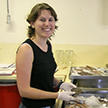Related Questions
- What is the newest animal species found?
- have you ever discoovered a dinosuar fossil?
- Why do we have so many animals in our universe but none are yet discovered? Also how can these animals help us
- In science i believe that there are some mysteries and problems that will remain unknown for possibly forever but in









The first human to throw a stone discovered energy. They imparted energy in the stone it travelled through the air and imparted its stored kinetic energy to whatever it hit.
0
Simon is right. The word energy can mean different things to different people. Scientifically, energy defined as the ability to do work on objects. This can be through kinetic energy (energy of movement or motion) or something called ‘potential energy’. This is stored energy (like in a bunched up spring).
I think you are talking more generally about electricity and power. People have been using fires to create heat and light and to boil water for thousands of years. Using boiling water to produce mechanical motion goes back about 2,000 years, but early devices were not practical. Since the late 1700’s steam engines have become a major source of mechanical power. The first power station was made in 1878 in the country Bavaria and it was driven by a steam engine.
0
If you mean ‘What scientists first spoke about energy and published work about it?’ then you could say Aristotle was the first to speak of energy (in the 4th century), but he called it vis viva for some reason.
However the concept of energy emerged out of the idea of a ‘living force’, which Gottfried Wilhelm von Leibniz (a German mathematician) defined as ‘the product of the mass of an object and its velocity squared’. He wrote this in the 1600’s
Émilie marquise du Châtelet published a book in 1740 which incorporated the idea of Leibniz with practical observations to prove that the “quantity of motion” of a moving object is proportional to its mass and the square of its velocity.
In 1802 Thomas Young was the first scientist to use the term “energy” in its modern sense.
Gustave-Gaspard Coriolis described “kinetic energy” in 1829, and in 1853, William Rankine coined the term “potential energy.”
0
I think the other scientist have answered this very well
0